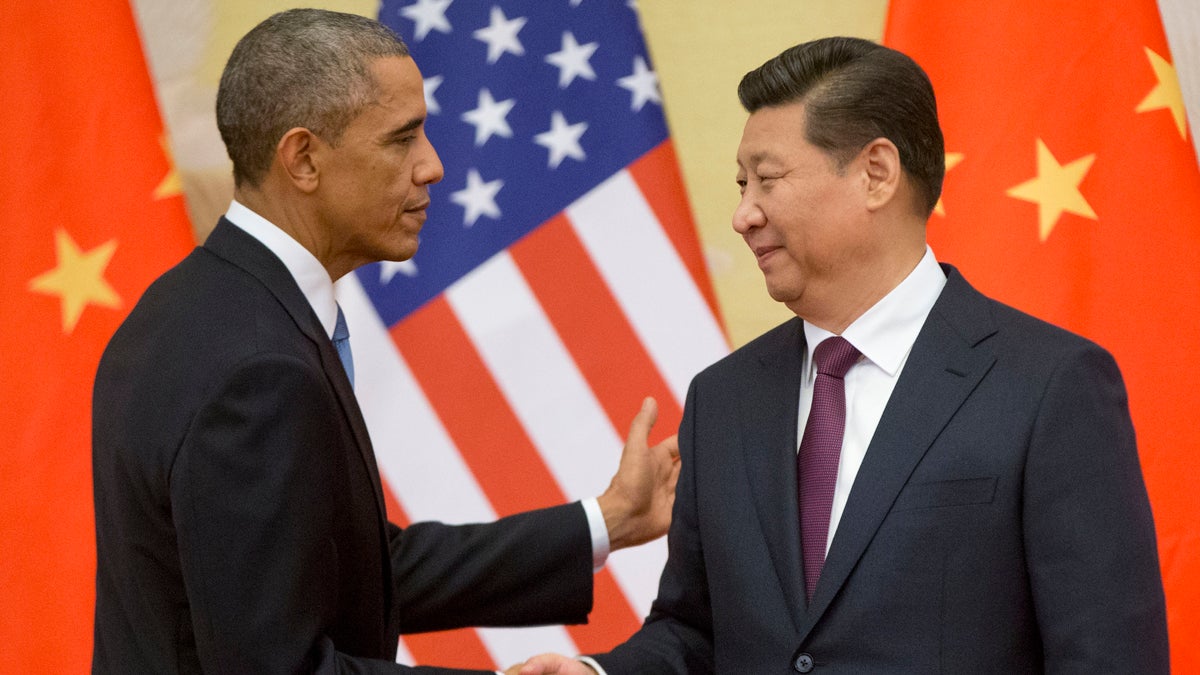Will the GOP have a climate plan in 2016?
Listen
President Barack Obama and Chinese President Xi Jinping shake hands following the conclusion of their joint news conference at the Great Hall of the People in Beijing
Climate change hurtled to a newly prominent role in both domestic and foreign policy this week after President Obama reached a landmark carbon reduction agreement with China.
With the post-midterm national political focus now turned squarely toward the presidential election, the question emerges: Will the GOP have a climate plan in 2016?
In the midterms, the GOP line on climate change was repeated often enough to work its way into the zeitgeist by way of The Colbert Report.
The comedian tore apart Republican lawmakers who echoed some version of the refrain “I’m not a scientist, but…” followed by a statement of skepticism regarding man-made climate change.
Unlike Colbert, environmental activists actually saw the catchphrase as a step forward.
“The “I am not a scientist’ is clearly kind of a defensive crouch that they’ve been pushed into because denying the science has turned out not to be an acceptable political position,” said David Goldston, senior advisor at the Natural Resources Defense Council Action Fund.
Climate on the agenda in 2014
That represents a change. In recent years, climate denial has been the go-to stance for Tea Party Republicans, but the issue has not been a major player at the ballot box. In the last presidential election, climate change didn’t even make it into the debates.
“In 2014, however, we saw the issue finally became an issue in many of the most hotly contested races,” said Anthony Leiserowitz, director of the Yale Project on Climate Change Communication.
Leiserowitz credits lobbying efforts by groups including the League of Conservation Voters and billionaire Tom Steyer’s NextGen Climate for landing climate on the agenda in the midterms. Though Steyer’s millions backed candidates who were largely unsuccessful at the polls, he has said it was money well spent to raise the profile of the issue.
Observers say the environment is likely to become even more of a flashpoint in 2016: Obama’s landmark China carbon deal, a 2015 international climate summit in Paris, and expected battles in Washington on the president’s power plant emission reductions regulations will likely keep attention on the issue over the next two years.
Whether the GOP develops its own proactive climate change platform by 2016, though, will come down to who gets the nomination, Leiserowitz said.
“Essentially you can think of this as the debate between the establishment Republican party and the Tea Party,” Leiserowitz said. “The establishment has largely accepted that climate change is real and a serious problem and needs some sort of policy action.”
But the Tea Party has taken the opposite stance, and forced many members of the GOP who long championed climate change legislation, like John McCain and Lindsey Graham, to backtrack on their positions, Leiserowitz said.
A conservative solution?
Some Republicans say now is the time to reverse that Tea Party trend. Among them is former South Carolina Representative Bob Inglis, who served in Washington for a dozen years before losing his seat in part, he said, for the “heresy” of believing in climate change.
Inglis believes the GOP needs to revamp its “retro” climate attitude if it hopes to appeal to a diverse pool of voters in the presidential election.
“That retro affect surely fit the Great Recession because we were mad,” Inglis said. “We were mad about our houses plummeting in value, we were mad about losing our jobs, we were upset, we were frightened, and so it’s natural that we went to what we knew: Comfort food, comfort coal, comfort oil.”
But as the recession lifts, Inglis said, a re-branding is necessary.
“That (attitude is) going to look oh-so-very- Great Recession as a style, and so I think that the presidential contenders will want to re-position the GOP,” Inglis said.
In 2011, Inglis started the Energy and Enterprise Initiative to push for a conservative climate change solution.
“What we’re trying to do is show that there’s a conservative way to address climate change through free enterprise,” Inglis said.
His proposal is what he calls a revenue neutral, border-adjustable carbon tax.
Revenue neutral means tax cuts in other areas would offset the new carbon tax, to avoid a growth in government. Border-adjustable means removing the tax from exports, and adding it to imports from countries that don’t themselves tax carbon.
Other prominent Republicans, including former Treasury Secretary Henry Paulson and former Secretary of State George P. Shultz, back versions of carbon taxes.
With no new climate legislation — carbon tax or otherwise — likely to pass under the new Congress, the question becomes whether political pressure from moderate members, Millennials, and other climate-concerned voters will push the GOP to incorporate a climate change policy into their platform for 2016.
“There’s going to be a civil war to some extent within the Republican party about what line to take,” the NRDC Action Fund’s David Goldston said.
Bob Inglis, for one, is optimistic. Just as Nixon went to China and Clinton passed welfare reform, he argues the country would only trust a Republican president to address climate change.
WHYY is your source for fact-based, in-depth journalism and information. As a nonprofit organization, we rely on financial support from readers like you. Please give today.



